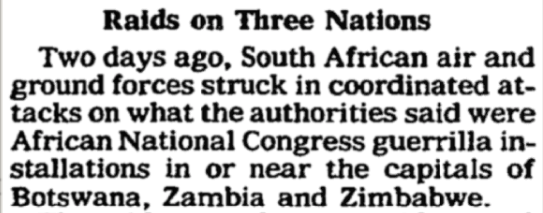Israel maintained a close and abiding relationship with the Apartheid regime in South Africa, even when virtually all other nations on Earth had cut ties & joined the international boycott. The alliance was more than mere convenience; rather, it was one based on shared values.
“The Jews took Israel from the Arabs after the Arabs had lived there for a thousand years. Israel, like South Africa, is an apartheid state,” South African Prime Minister Hendrik Verwoerd proudly declared back in 1961.
In April 1976, two months before the Soweto Uprising, South African Prime Minister (and known former Nazi sympathizer) John Vorster made an official state visit to Israel, where he was hosted by Israeli Prime Minister Yitzhak Rabin.
A number of friendship pacts and bilateral economic, military and nuclear agreements were signed. At a banquet held in Vorster’s honor, Rabin hailed “the ideals shared by Israel and South Africa: the hopes for justice and peaceful coexistence.”

Rabin also praised Vorster as a champion of freedom. Both Israel and South Africa, Rabin said, faced “foreign-inspired instability and recklessness.” Similarly, Vorster lamented that both South Africa and Israel were both victims of the enemies of Western civilization.
Only a few months later, an official South African government document reinforced this shared predicament: “Israel and South Africa have one thing above all else in common: they are both situated in a predominantly hostile world inhabited by dark peoples.”

The groundwork for such close ties had been forged over the preceding couple of years by the defense ministers of Israel and South Africa.
In November 1974, after visiting the leadership in Pretoria, the Israeli Defense Minister emphasized to the Knesset the “vitally important” economic, political and military ties between the Apartheid state in South Africa and the Zionist state in Israel.
The Defense Minister noted that “this cooperation is based not only on common interests and on the determination to resist equally our enemies, but also on the unshakeable foundations of our common hatred of injustice and our refusal to submit to it.”
That Israeli Defense Minister was Shimon Peres. His Apartheid counterpart? Future Prime Minister PW Botha.
The following year, through “top secret” correspondence with Botha, Peres offered to sell Israeli nuclear warheads to the Apartheid regime.
A bilateral propaganda outfit named the “Joint Secretariate for Political and Psychological Warfare” was established between the two states in an effort to boost the public image of Apartheid.
Here is, left to right, South African propaganda chief Eschel Rhoodie, Israeli Prime Minister Yitzhak Rabin, South African intelligence head Hendrik van den Bergh and Israeli Defense Minister Shimon Peres at the Prime Minister’s Residence in Jerusalem, April 11, 1975.

Facing increased internal and external resistance to Apartheid in the mid-1980s, Botha – as prime minister – increased indefinite detention without trial, torture, and murder of Black South Africans.
On May 22, 1986, the New York Times reported that “South African air and ground forces struck in coordinated attacks on what the authorities said were African National Congress guerrilla installations in or near the capitals of Botswana, Zambia, and Zimbabwe.”
Botha warned that the strikes were only “the first installment,” insisting that “South Africa has the capacity and the will to break the ANC if we stand together.”
In response, the US and UK delivered a “rebuke” of South African violence. Shimon Peres was Israel’s Prime Minister at the time.
By 1987, Israel was one of the only nations to still maintain diplomatic ties with Apartheid South Africa and was one of the last holdouts against the international boycott campaign.
In 2005, @guardian reporter @ChrisMcGreal asked Peres “about his close dealings with the old South African regime, including two periods as prime minister during the 1980s when Israel drew closest to the apartheid government.”
His response was to brush away history. ‘I never think back. Since I cannot change the past, why should I deal with it?’ he said.”
